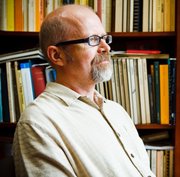CONWAY — To say that a postgraduate stint in the Peace Corps was a life-changing experience for University of Central Arkansas linguistics professor Tim Thornes is, believe it or not, probably an understatement.
“I didn't even realize there was such a thing as linguistics until the Peace Corps,” said Thornes, who is now working to build a linguistics degree-granting program in the university's writing department — the only one in this state or neighbors Louisiana or Mississippi.
But after three years in Africa, including a west-to-east-coast trip across the heart of the continent, Thornes came away having met an anthropologist who was studying languages and set him on a path that would lead him to what has become his life's work for nearly two decades: studying and preserving the Native American Northern Paiute language, whose speakers reside mostly in northern Nevada and eastern Oregon.
“It just made sense to me,” said Thornes of the linguistics field. “I liked it and I thought wow, this could be really cool.”
It was a refreshing thought for the South Dakota native who had earned his bachelor's degree in English with a writing emphasis. After school, he was without direction and did “a variety of different things,” including learning carpentry, a skill he applied building schools in the Peace Corps.
“I didn't really know what to do as an English major, so I basically decided not to do anything with it,” he said.
But the journey from Africa to the Pacific Northwest wasn't quite direct. With his fledgling interest but little training in the field, he returned to the states and applied for the graduate program at the University of Oregon intending to study African languages. There, as a graduate student, he volunteered to work with the last speaker of Yahooskin, an undocumented dialect of Northern Paiute.
“I thought it would be good practical experience. It was my first time to do fieldwork. When I went into it that first summer, I had no idea what I was getting into.”
The goal was to create a beginner's phrasebook. Some 16 years later, Thornes is still working with the language, ultimately now with the goal of publishing oral literature of various genres — traditional stories, ethno-histories, autobiographies, procedural narratives, legends, and conversation — with side-by-side English translations and recordings of the spoken language.
To the uneducated, it is magician's work. To hear a completely foreign tongue describing an experience as innocuous as buying eggs and not only strive to understand it, but to write it down when no native system exists for doing so and then study its structure and nuances borders on the miraculous.
But there is no wand at work here, only meticulous diligence. Thornes said every minute of spoken language takes about two hours to study “at the very least,” thus a 40-minute conversation about attending boarding school in the 1930s is something along the lines of 80 hours to translate and analyze.
“I could spend a lifetime on what I have in my office,” he said.
For Thornes, the difference between learning a specific language — say German or Spanish — and studying linguistics is the difference between language and Language, with a capital L. It's a study of differences and similarities, of how different people use a finite set of tools (sounds we can produce) to perform an infinite number of operations (expressing our thoughts and feelings).
“The focus is on gathering data and looking at how the pieces work … looking for patterns,” he said.
It can be humbling work. Thornes recalls being invited to an elder's potluck on the Burns Paiute reservation after working on the dialect study and actually hearing fluent native speakers conversing for the first time.
“It changed my whole understanding of the language,” he said.
It can also be sad work.
“I had no idea how many funerals I'd be attending when I got into this field,” said Thornes.
Northern Paiute is an endangered language spoken by just a few hundred people with most of its active, fluent native speakers over the age of 50. The Yahooskin speaker Thornes worked with died at 87 a few years after, but died perhaps somewhat more content.
“I think it legitimized the language to a certain extent. He was just happy that somebody gave a sh*t, really, because it was important to him. And he was happy that somebody saw that importance.”
Just how a language becomes endangered is complex. Sometimes social stigma forces it out of use, like a linguistic genocide. Other times, as with Northern Paiute, it's a matter of being surrounded by a language like English and having other, more concerning needs. When a community's housing and health are at risk, making sure the language carries on loses priority.
It's a situation Thornes said has created a “global heritage crisis.” Of some 6,000 languages in the world, around two disappear every month because the last fluent native speakers die.
And with that, the world loses “a window into the extent of our humanity,” Thornes said. “[We lose] a chance to see how we solve communications problems and how it's done in so many different ways.”
And while he won't speak for the people who lose their language, he said he's heard one comment many times before.
“I do hear people say a lot that their identity is tied up in the language, that the loss of their language is a loss of who they are … and a loss of the legends and stories the language is used to tell.”
